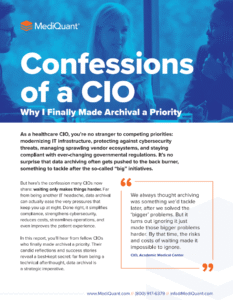Generative AI Underlines Continuing Value of Healthcare Data Archiving Solutions
Written By: Jim Jacobs, President and CEO, MediQuant
An AI platform that turns clinicians notes into structured data within seconds. A virtual assistant that gathers 20,000 nurse handoffs per shift.
AI in healthcare is no longer just hype — it’s actively being implemented to enhance clinical care and operational efficiency. Generative AI offers health systems and hospitals the ability to derive more value from patient claims, monitor payers more closely, equip physicians with useful information at the point of care, and much more.
Driving these advancements, however, requires relevant data — even hospital archive data from 10 or more years ago — that has been normalized and made available to current software. Preserving data in a central repository ensures it’s continually accessible and usable by hospitals to bolster finances, improve workflows, and take better care of patients.
1. Keeping Payer Scorecards for Oversight

2. Recovering Revenue Via Denial Management
3. Helping Physicians at the Point of Care
How Health Data Archiving Enables Data Usefulness
Many hospital executives still imagine an archive at the center of various legacy systems, with arrows pointing from legacy systems to a central repository where information is stored as systems are retired. There are no arrows leading from the repository. In this view, an archive is static, the place where archived data goes to die.
With the rise of generative AI, however, executives are realizing that historic data retains its value for much more than compliance and release-of-information use. While arrows should lead from legacy applications to the data repository, arrows should also emanate from the repository, fueling secondary uses that include billing and collections, patient care, claims management, and medical research.

But not all healthcare data archiving solutions are created equal. For data to be useful for secondary purposes and tactical use cases, it must be discrete, accurate, and reliable — traits that not all archive vendors can meet.
More Thought-Leadership
Why Healthcare Data Conversion Requires Precision, Not Just Pace
By MediQuant | December 30, 2025 | BlogData conversion in healthcare is a critical process that goes beyond simply transferring information between systems. In a feature article with Healthcare IT Today, Dave Lamar, Chief Growth Officer at MediQuant, discusses the...
Decommissioning Infor Lawson ERP? Here’s How to Prepare
Jennifer Spencer Howell, Senior Manager of Implementation Services & Tammy Stryker, Financial Implementation Consultant Lead | December 10, 2025 | BlogEnterprise resource planning (ERP) systems are one of the most critical IT investments for organizations. Between...
How Historical Data is Shaping the Future of AI in Healthcare
Jim Jacobs | President & CEO, MediQuant | December 2, 2025As artificial intelligence (AI) continues to gain traction in healthcare, the focus is shifting from whether to adopt AI to how it can solve real-world challenges. At the heart of successful AI...
Contact Us Today








